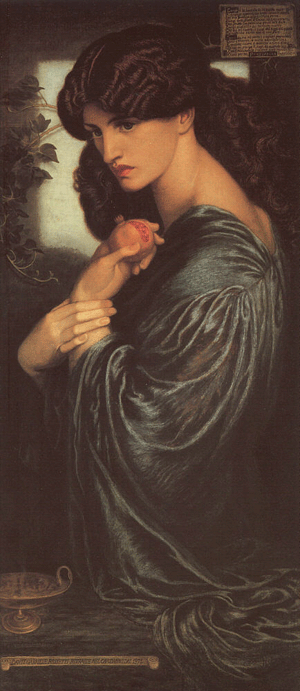What do you know of Persephone?


Ovid, "The Rape of Proserpine,"Metamorphosis:
"...I saw,
Myself with my own eyes, your Proserpine.
Her looks were sad, and fear still in her eyes;
And yet a queen, and yet of that dark land
Empress, and yet with power and majesty
The consort of the sovereign lord of Hell."
The mother heard in horror, thunderstuck,
It seemed and turned to stone. Then...she soared...
Indignant before Jove and said, "I come
To plead for my own flesh and blood, yours too...."
And Jove replied: "The child is yours and mine,
Our common care and love. If we allow
Things proper names, here is no harm, no crime,
But love and passion. Such a son-in-law
If you, Ma'am, but consent, will not disgrace us...."
Then Jove, to hold the balance fair...
Portioned the rolling year in equal parts.
Now Proserpine, of two empires alike
Great diety, spends with her mother half
The year's twelve months and with her husband half.
Straightway her heart and features are transformed;
That face which even Pluto must have found
Unhappy beams with joy, as when the sun,
Long lost and hidden in the clouds and rain,
Rides forth in triumph from the clouds again.
This has been read as a story about learning to negotiate two realms, two languages:
the rationalist and the intuitive/emotional,
about exploring the life force of the psychic depths,
the potential generativity of the unconscious.
Images of Persephone: Feminist Readings in Western Literature.
Ed. Elizabeth T. Hayes, Gainesville : University Press of Florida, 1994.
James Hillman on "avoiding psychic monotheism"
Eavan Boland, "The Pomegranate"
The only legend I have ever loved is
the story of a daughter lost in hell.
And found and rescued there.
Love and blackmail are the gist of it.
Ceres and Persephone the names.
And the best thing about the legend is
I can enter it anywhere. And have.
As a child in exile in
a city of fogs and strange consonants,
I read it first and at first I was
an exiled child in the crackling dusk of
the underworld, the stars blighted. Later
I walked out in a summer twilight
searching for my daughter at bed-time.
When she came running I was ready
to make any bargain to keep her.
I carried her back past whitebeams
and wasps and honey-scented buddleias.
But I was Ceres then and I knew
winter was in store for every leaf
on every tree on that road.
Was inescapable for each one we passed.
And for me.
It is winter
and the stars are hidden.
I climb the stairs and stand where I can see
my child asleep beside her teen magazines,
her can of Coke, her plate of uncut fruit.
The pomegranate! How did I forget it?
She could have come home and been safe
and ended the story and all
our heart-broken searching but she reached
out a hand and plucked a pomegranate.
She put out her hand and pulled down
the French sound for apple and
the noise of stone and the proof
that even in the place of death,
at the heart of legend, in the midst
of rocks full of unshed tears
ready to be diamonds by the time
the story was told, a child can be
hungry. I could warn her. There is still a
chance.
The rain is cold. The road is flint-coloured.
The suburb has cars and cable television.
The veiled stars are above ground.
It is another world. But what else
can a mother give her daughter but such
beautiful rifts in time?
If I defer the grief I will diminish the gift.
The legend will be hers as well as mine.
She will enter it. As I have.
She will wake up. She will hold
the papery flushed skin in her hand.
And to her lips. I will say nothing.
Copyright © 1997-2002 by The Academy of American Poets
From In a Time of Violence, published by W. W.
Norton & Company, Inc.,
1994. Copyright © 1994 by Eavan Boland